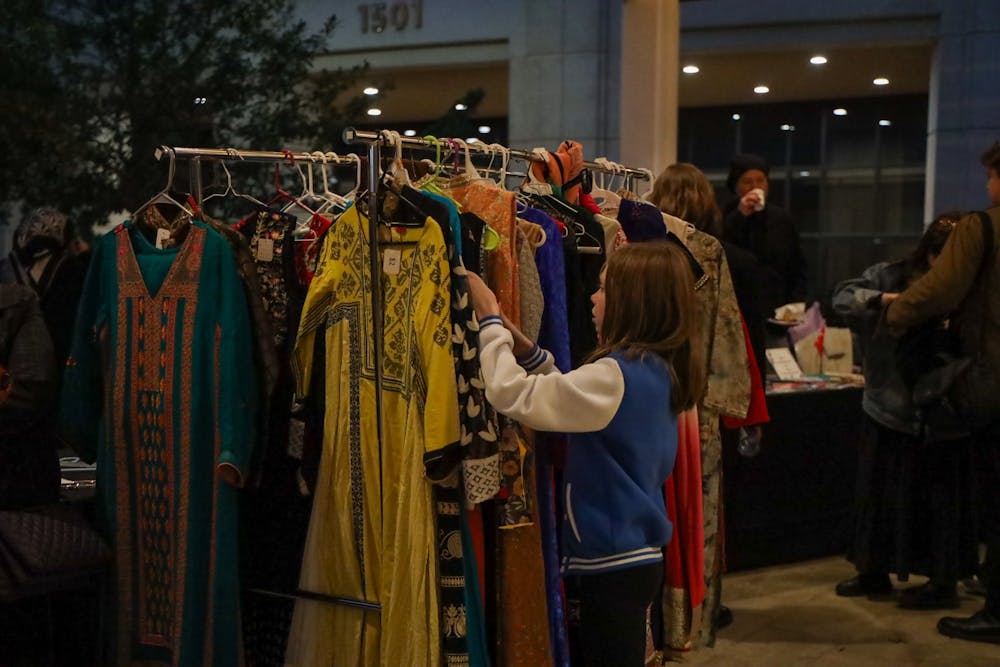Alive with crowds, the smell of hot food wafting from the food truck and the hum of energetic chatter, downtown Columbia transformed into a vibrant night market in order to celebrate Ramadan, the ninth and most sacred month of the Islamic calendar. In Columbia, SC—a place not necessarily associated with having a thriving Muslim community—Muslims from all different walks of life came together to share an evening of breaking their fasts together, spiritual reflections, stories and connections during the event, which was hosted by the USC Muslim South project, Columbia Museum of Art and the Muslims Association with Columbia.

Students from the USC Muslim Student Association—an on-campus student organization dedicated to supporting Muslim students and providing a welcoming space for interfaith engagement on campus—tabled at the event and spoke on the importance of events such as this one in the Columbia area.
“I think it’s really good for non-Muslims to kind of get the awareness of what we do, and especially at a time like Ramadan. It’s such a giving time and a lot of people aren’t really educated about what it is, so having these events kind of bring awareness to that gets people excited for it as well,” said Khadijah Kumte, a sophomore and the vice president of the USC MSA chapter.

Ramadan is known as the holiest month in Islam, where Muslims will fast during daylight hours for its duration. The month offers a special time for connection in Muslim communities, as local mosques often hold iftars and special nightly prayers that many will attend. It also emphasizes giving back to the community through charity and service. Most of all, however, Ramadan is a time of spiritual reflection, where individuals renew their relationship with their faith and make specific goals to be better Muslims, community members and people.
“In bigger cities they have these events all the time, but this is the first time Columbia has ever done anything like that, so I hope people know that we’re still here and bring awareness to what we do,” Kumte said.

Columbia hosted the Ramadan Night Market on March 6, featuring a host of local vendors selling everything from handmade jewelry to colorful paintings and local food trucks. People from all backgrounds, religions and races were encouraged to attend.
Shabnam Miri, a current graduate student at USC, attended the market as a vendor, selling painted ceramic items, jewelry, cross-stitch and pottery. Miri is appreciative of the opportunity to display her artwork at the Columbia Museum of Art for the Night Market, but wishes there were more opportunities to do so in the greater Columbia area.
“I wish we could have some big space here for the arts. I’ve been here about six months. I immigrated to here from Iran, Persia. I wish we could present our arts in a good space like this museum,” said Miri.

Noah D. Gardiner is an associate professor of religious studies at USC who has worked extensively alongside Sarah Waheed, a specialist of South Asian History, in order to initiate the Muslim South project. The Ramadan Night Market was made possible in part because of the Muslim South research initiative. The Muslim South is a research initiative funded by the USC humanities collaborative. This program intends to curate the history and experiences of Muslims living in the southern United States.
Gardiner understands the importance of community-facing events in order to bring communities in Columbia together. Night events during Ramadan are particularly significant for Muslim communities because they act as ways for the community to socialize and engage with each other.

“Nighttime activities during Ramadan are just such a part of Ramadan around the world that for us it’s just an opportunity to make a space for everyone to come to that might be familiar if they’re coming from other places and can at least be an enjoyable experience for them,” Gardiner said.
Additionally, with the northern United States boasting a larger Muslim population than the South, events like the Night Market are especially important in order to shine a light on the diverse and complex communities that might be overlooked. Gardiner stresses the importance of events like the market in order to unite the community in Columbia and to promote understanding between the different cultures.
"I think any chance that people can come and interact with the local Muslim community is a plus," Gardiner said.



